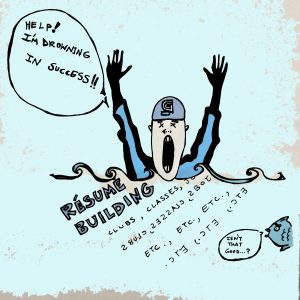“Where are you from?” This question precedes all small talk at orientation, parties, or other inevitable social events (it’s usually quickly followed by “what’s your major?”). This simple question begs a simple answer, and for the vast majority of us, at this stage in our lives, the answer is simple. New York, California, Korea, Ohio, Brazil … the list goes on.
Then there are those, myself included, for whom the answer isn’t so simple. The question carries with it a special weight for those of mixed backgrounds or those who grew up in different places. How do we choose which identity to put forth? And why must we choose? Taking myself as an example, how the conversation will proceed is quite different depending on if I answer “England” or “France” (which unfortunately is just the tip of the iceberg in my case).


Erin Annick
But if “where are you from” is a simple question, why agonize over it at all? Because the answer matters a great deal. There must be a reason for “where are you from” to have earned its spot as the most commonly asked question.
Allow me to suggest one reason among many. When people ask where we are from, what they are really asking is who we are. It and “what’s your major,” are a quick way of gauging what type of person you are. Thus it is an undeniable fact that where we are from defines who we are as people—whether we want it to or not—in the eyes of others, but also in our own.
“Where are you from?” is an example of the world forcing us to assume a cultural identity. And when we answer, we bring with us all the stereotypes, generalizations, and preconceptions attached to the culture that we choose. This is true for many groups here at Georgetown, particularly the international students (one of whom I am).
Anyone who’s kept half an eye open on campus has noticed that there is a tendency for international students to flock together (usually in groups of others from the same country). Why do they do this? And is there something wrong with it? I personally cannot deny that sticking to your cultural group seems to foster a certain separatist mentality at Georgetown: “us and them,” “my cultural group and the Americans.”
I also won’t deny that at times I have found myself judging fellow internationals for it. Why did you even come here if you’re just going to stick with people from the same country? Conversely, I am met with equal judgment when, upon finding out where I am from (wherever that may be) someone asks me if I know someone who’s from there too, and I don’t. “Why not?” their eyes seem to suggest.
But I haven’t answered my first question. Why do they—or we—the international students, do this? Why do we all really, as humans, gravitate towards people from the same place as us? Because it is easy, because it is safe. Because for all us, where we are from (our culture) indicates what kind of person we are.
And so, we flock towards people of that same place, because we see them as similar souls, who hold with them the promise of all the comfort and familiarity of home. They are people to go to when this new culture (America, the East Coast, college, etc.) becomes too much for us. They just … get it. You know? Everyone does this; international students are just more likely to, because the new culture they confront is so much more different, foreign.
Is there something wrong with this? Inherently, no. People are free to associate with whomever they like. You cannot force anyone to integrate into a culture or be friends with someone they have nothing in common with, if they do not want to. I asked before what the point was of coming to study in the U.S. if you only make friends with people from home.
Maybe the point is just that: to study, to learn and nothing more. However there is a different type of learning, other than academic, that studying in a foreign country should give you: cultural learning, which begets understanding and promotes tolerance. And this particular kind of learning can be achieved only through integrating into a group whose culture is not your own.
But this is scary; this is hard. And why? Part of the fear is that we will lose our old culture if we go towards a new one. This is false. We do not shed our old skin for a new one; we simply acquire an additional layer. What mainly makes it difficult is that the world can’t grasp the idea of someone having more than one culture.


But all of us here will be subject to this dynamic nominalism, international or not. We came to Georgetown because we want to move on to greater things, different places. And all those places will leave their marks on us. It is absurd to think you can escape the culture of the place in which you live. “So, here you are/too foreign for home/too foreign for here, never enough for both,” writes Ijeoma Umebinyuo. So what? You are enough! Hell, if people can accept the concept of the Holy Trinity, they can damn well accept the concept of multiple cultural identities. Having more than one culture does not leave you with pieces of each; it leaves you with full wholes. You don’t need to be cut up into boxes or forced into an ill-fitting one.
At the end of the day, yes, maybe some things will just always be too American, too French, too Chinese for you. But you won’t know until you try them. And so you should not fear becoming complicated. You are still who you were, but think of all that you could be! You do not choose; you do not lose; you just collect in culture. You must leave home and build your own, on the foundations of the old one, but with new bricks that you picked up along the way.






Or maybe they’re just asking where are you from as an icebreaker to get to know you as an individual, which renders your exhausting examination of your myriad “identities” both unnecessary and a waste of time.